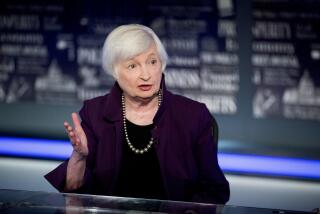SEC faults credit-rating companies
- Share via
NEW YORK — The credit-rating firms whose endorsements of mortgage-backed bonds helped fuel the ill-fated boom in subprime lending were beset by conflicts of interest, the Securities and Exchange Commission said Tuesday.
The agency’s finding came after a nearly yearlong investigation of the conduct since 2004 of the three main debt-grading firms -- Standard & Poor’s, Moody’s Investors Service and Fitch Ratings.
In its report, the SEC quoted e-mail messages in which some rating analysts appeared to question whether they could thoroughly assess an avalanche of increasingly complex securities that they had to review as Wall Street and the rating firms tried to cash in on the mortgage boom.
In an April 2007 e-mail, an analyst wrote that her firm’s evaluation methodology did not take into account even half of the risk of a certain issue of securities. But, she added, the issue “could be structured by cows and we would rate it.”
In a December 2006 e-mail, a manager at the same firm wrote that the rating companies were helping to turn the market for complex mortgage-backed securities known as collateralized debt obligations into a “monster.”
“Let’s hope we are all wealthy and retired by the time this house of cards falters,” the analyst wrote.
The report doesn’t say where the analysts worked.
SEC Chairman Christopher Cox said the e-mails painted a damning picture of “serious problems within these firms.”
Among the types of conduct cited by the report, the rating firms let their research managers discuss fees with clients whose securities the firms’ analysts were supposed to be rating objectively.
Rating-firm employees also discussed whether certain rating policies could cause their firms to lose business, according to the report.
The companies have agreed to alter their practices and have put many of the changes in place, Cox said.
The SEC last month also proposed a series of ethics reforms for credit-rating firms.
The firms also agreed last month to limit conflicts of interest by agreeing to change the way they were paid as part of a settlement with New York Atty. Gen. Andrew Cuomo.
The SEC could take enforcement actions against the firms if it turns up wrongdoing in its investigation, which is continuing, Cox said, without elaborating. But because the SEC assumed formal oversight of credit raters only in September, it’s unclear whether the agency could bring cases for infractions before then.
The high ratings assigned by the firms on thousands of bonds that Wall Street investment banks created from pools of subprime mortgages cleared the way for pension funds and other institutional investors to purchase the securities.
The three firms issued statements Tuesday that emphasized reforms they were undertaking.
S&P; said it “is fully committed to increased openness and transparency, and . . . we will continue to take any additional steps needed to improve our processes and ensure they are of the highest quality.”
Moody’s said it “has initiated a wide range of reforms that refine our analytical methodologies, improve transparency and enhance our overall independence.”
David Weinfurter, managing director at Fitch, said the SEC “has not informed Fitch of any finding that Fitch acted in a manner inconsistent with Fitch’s code of conduct.”
--
More to Read
Inside the business of entertainment
The Wide Shot brings you news, analysis and insights on everything from streaming wars to production — and what it all means for the future.
You may occasionally receive promotional content from the Los Angeles Times.










